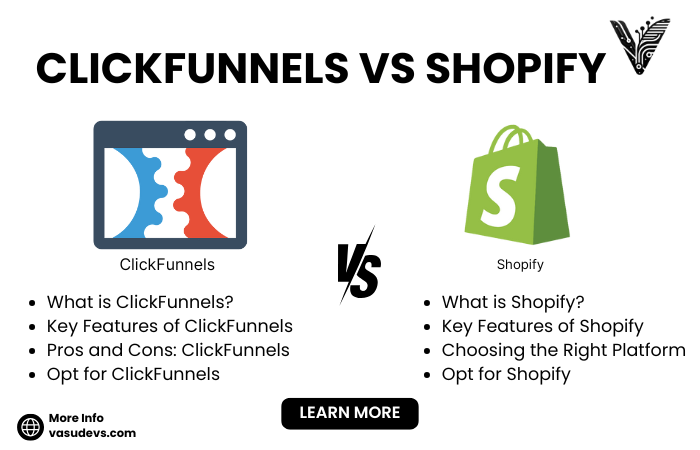Choosing the right platform for your online business is crucial for its success. With so many options available, two popular choices often stand out: ClickFunnels vs Shopify. While both are excellent tools, they serve different needs, making it crucial to understand their unique features. In this blog, we’ll dive deep into the ClickFunnels vs Shopify debate, exploring their strengths, weaknesses, and use cases to help you decide which platform suits your business goals best.
ClickFunnels:
A powerful tool designed for creating high-converting sales funnels. With features like landing page design, email marketing automation, and A/B testing, ClickFunnels helps businesses focus on customer conversions. In the ClickFunnels vs Shopify discussion, ClickFunnels shines for its ability to streamline the customer journey from lead generation to purchase.
Shopify:
A leading e-commerce platform that enables businesses to build, manage, and grow their online stores. It offers strong tools for inventory management, payment processing, and multi-channel selling, making it ideal for comprehensive online retail operations. When evaluating ClickFunnels vs Shopify, Shopify stands out as the go-to choice for businesses needing a scalable online store.
Key Features of ClickFunnels:
- Sales Funnel Creation: Offers a variety of pre-designed templates to build customized sales funnels tailored to specific marketing strategies.
- Landing Pages and Lead Generation: Enables the creation of compelling landing pages aimed at capturing leads and driving conversions.
- Email Marketing Automation: Integrates email marketing tools to automate follow-ups, enhancing customer engagement and retention.
- A/B Testing: Provides split-testing capabilities to optimize funnel performance by comparing different versions and determining the most effective approach.
In the ClickFunnels vs Shopify comparison, these features make ClickFunnels a powerful solution for businesses focused on conversions.
Key Features of Shopify:
- Customizable Storefronts: Offers a wide selection of themes and design tools to create visually appealing and brand-consistent online stores.
- Product and Inventory Management: Provides robust tools for managing product listings, tracking inventory, and handling variations, facilitating smooth store operations.
- Payment Processing: Supports multiple payment gateways, including its own Shopify Payments, ensuring secure and flexible transaction options for customers.
- Multi-Channel Selling: Enables sales across various platforms, including social media, marketplaces, and in-person through Shopify POS, expanding market reach.
When comparing ClickFunnels vs Shopify, Shopify’s strong e-commerce tools make it a preferred choice for businesses managing a large product catalog.
Pros and Cons: ClickFunnels vs Shopify
This table highlights the ClickFunnels vs Shopify keyword naturally while providing a clear and brief comparison, enhancing SEO and user engagement.
ClickFunnels
| Pros | Cons |
|---|---|
| Specialized in creating high-converting sales funnels. | Higher pricing, starting at $97/month, might be steep for small businesses. |
| Includes tools like email marketing automation and A/B testing for better conversions. | Limited e-commerce features, making it less suitable for large product catalogs. |
| Ideal for businesses focusing on lead generation and customer journey optimization. | Steeper learning curve for beginners compared to Shopify. |
Shopify
| Pros | Cons |
|---|---|
| Comprehensive e-commerce platform with robust tools for managing online stores. | Additional transaction fees unless using Shopify Payments. |
| Offers multi-channel selling across platforms like social media and marketplaces. | Lacks advanced native tools for sales funnels compared to ClickFunnels. |
| Scalable for businesses of all sizes, from startups to enterprises. | Some advanced features require paid apps, increasing overall expenses. |
ClickFunnels vs Shopify: Choosing the Right Platform
ClickFunnels vs Shopify: Choosing the Right Platform
Opt for ClickFunnels if:
Your primary goal is to create targeted sales funnels to drive conversions.
You require integrated marketing and automation tools to manage customer journeys.
Your product range is limited, and the focus is on high-ticket items or services.
Opt for Shopify if:
You aim to build a comprehensive online store with a broad product catalog.
You need robust inventory and order management systems to handle large volumes.
You plan to sell across multiple channels and require a scalable solution to support business growth.
Integrating ClickFunnels and Shopify
For businesses seeking the advantages of both platforms, integration is possible. By combining ClickFunnels’ sales funnel capabilities with Shopify’s e-commerce strengths, you can create a seamless experience that leverages the benefits of both systems. This approach allows businesses to enjoy the best of both worlds, solving the ClickFunnels vs Shopify problem efficiently.
Get Started Today!
The ClickFunnels vs Shopify debate doesn’t have to be overwhelming. Let the experts at Vasudev Technolabs guide you every step of the way. Whether you’re building a new online store or optimizing your sales funnels, we’ve got the skills and experience to make your vision a reality.
If you found this blog helpful, you should check out some of the other blogs below:
- Power of an SEO Optimizer: Boost Your Online Visibility
- How to Set Up Shopify ERP for Your E-commerceBusiness
For more insights and updates on how Shopify ERP can transform your business operations, follow us on Instagram, Facebook, LinkedIn, and Twitter.









Leave A Comment